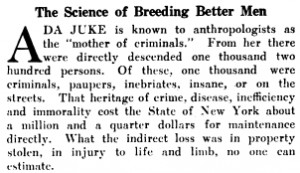After Francis Galton’s address to the American Sociological Society, “Eugenics: Its Definition, Scope, and Aims” a certain Benjamin Kidd responds thusly: For Mr. Pearson, I think, proposed to give the kind of people who now scribble on our railway carriages no more than a short shrift and the nearest lamp-post. I hope we shall not …
Category: Francis Galton
“Eugenics: Its Definition, Scope, and Aims” by Francis Galton
One of the earliest, more definitive beginnings of the Eugenics movement, was this address given by Francis Galton. Eugenics got its bad rap by its association with the Nazis. Its important to observe that its most ardent proponents were Americans. “Eugenics: Its Definition, Scope, and Aims” by Francis Galton. Read before the Sociological Society at a …
Eugenics as a Religion and Social Darwinism, Collin Wells
Source: Dr. Collin Wells, “Social Darwinism” a paper presented in 1907, found in The American Journal of Sociology, pages 706-709 Finally, what is the evolutionary value of certain ideals? Let us take individualism, the ideal of democracy, which has tacitly figured in many of the phenomena to which I have already referred. Let us go …
Scientific American: “The Science of Breeding Better Men” 1911
Editorial from a 1911 edition of Scientific American [Source]: Sci-Am’s Editor’s note: This editorial was written and published in 1911. Although our editors of a century ago pondered some lofty aspirations for the orderly future of humans, it was only three decades later that the brutal reality of a Nazi social order suffused with a …
Julian Huxley: Population Control, Eugenics, and Birth Control all part of the same Program
Contemporary advocates for birth control exhibit no awareness whatsoever that birth control was always conceived in the context of ‘eliminating the unfit,’ ie., eugenics. Eugenics, in turn, was considered a straight-forward logical extension of Darwinism. Eugenics was seen as human control of human evolution, and was always tied into discussions on ‘population control.’ These are …
Charity a Hindrance to Natural Selection
In the following foreword from a compilation of 12 eugenic lectures (1914), we see that eugenics is perceived as merely applied evolution. Furthermore, ‘modern man,’ being a sympathetic being, keeps alive those that should die. With luck, principles of breeding already used with animals will be brought to bear on humans. ——————- Foreword by Lewellys …
Francis Galton Coins the Word ‘Eugenics’ as the Science of Better Breeding: Men, Brutes, and Plants. Quote of the Day
A little known fact is that eugenics was seen as the application of principles of heredity, in particular those principles as understood by Darwin. In this excerpt, Francis Galton (Darwin’s cousin), coins the word eugenics and explicitly refers to it as a science. The principles of heredity thus applied, he says, are “applicable to men, …
Eugenics Quote of the Day: ‘Eugenics is a great force in the evolution of man.” Francis Darwin (son of Charles)
Francis Darwin in Francis Galton (the Galton Lecture) as found in The Eugenics Review, 1914: But it is time to speak of Galton as a eugenist–on which if we look to the distant future his fame will reset. For no one can doubt that the science of eugenics must become a great and beneficent force …
Frederick Osborn, Galton and Mid-Century Eugenics, 1956 Eugenics Review published lecture and “Voluntary Unconscious Selection”
Frederick Osborn, president of the Population Council and steadfast advocate for eugenics, in a 1956 speech recorded in the Eugenics Review. [SOURCE] […] Galton never envisaged any system of arbitrary controls, except for the more serious mental and physical handicaps, which should be treated like a form of communicable disease. But he did propose that …
Leon Cole on the Social Body and Our Duty to Future Generations
From The Relation of Philanthropy and Medicine to Race Betterment by Leon J. Cole, University of Wisconsin, at the First Conference for Race Betterment (1914) Among those who have in their treatment of this subject emphasized the importance of the natural selection viewpoint may be mentioned especially Herbert Spencer, Francis Galton, and Karl Pearson, the …
- 1
- 2


Recent Comments